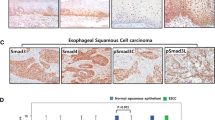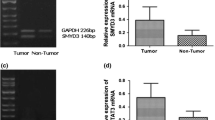Abstract
Background
The transforming growth factor-β/Smads signaling pathway plays an important role in tumorigenesis and progression in cancer, and may closely be related to the biological behaviors of some malignant tumors, such as gastric carcinoma. In this study, we investigated the roles of Smad3 and Smad3 phosphoisoforms in the prognosis of gastric carcinoma.
Methods
We investigated the expressions of Smad3, pSmad3C(S423/425), pSmad3L(T179), pSmad3L(S204), and pSmad3L(S213) in tumor tissue microarrays of 442 gastric carcinoma patients who underwent curative surgery using immunohistochemistry and assessed their correlation with clinical outcome.
Results
Positive Smad3 expression was observed in 33.5 % of gastric carcinoma. The rates of positive Smad3 phosphoisoforms expression varied according to the location of phosphorylation within Smad3: pSmad3C(S423/425) 28.5 %, pSmad3L(T179) 5.9 %, pSmad3L(S204) 1.8 %, and pSmad3L(S213) 20.8 %. Positive Smad3 expression was associated with diffuse type (p = 0.003), poorer histologic differentiation (p = 0.005), more frequent lymph node metastasis (p = 0.001), and higher AJCC stage (p = 0.006). Multivariate analyses revealed that Smad3 expression (p = 0.041), pSmad3L(T179) expression (p = 0.011), pSmad3L(S213) expression (p = 0.003), and American Joint Committee on Cancer (AJCC) stage were independent predictors of shorter disease-free survival. Smad3 expression (p = 0.033), pSmad3L(T179) expression (p = 0.012), pSmad3L(S213) expression (p = 0.005), and AJCC stage were also independent predictors of shorter overall survival. pSmad3C(S423/425) expression tended to show favorable influences on both disease-free survival (p = 0.134) and overall survival (p = 0.232).
Conclusions
Smad3, pSmad3L(T179), and pSmad3L(S213) expression might be independent predictors of both shorter disease-free survival and shorter overall survival in gastric carcinoma patients after curative surgery, and might help clinicians identify patients at high risk of recurrence.


Similar content being viewed by others
References
Danaei G, Vander Hoorn S, Lopez AD, Murray CJ, Ezzati M. Causes of cancer in the world: comparative risk assessment of nine behavioural and environmental risk factors. Lancet. 2005;366:1784–1793.
Harrison JC, Dean PJ, Vander Zwaag R, el-Zeky F, Wruble LD. Adenocarcinoma of the stomach with invasion limited to the muscularis propria. Hum Pathol. 1991;22:111–117.
Ichikura T, Tomimatsu S, Okusa Y, Uefuji K, Tamakuma S. Comparison of the prognostic significance between the number of metastatic lymph nodes and nodal stage based on their location in patients with gastric cancer. J Clin Oncol. 1993;11:1894–1900.
Massague J. TGFbeta in cancer. Cell. 2008;134:215–230.
Ross S, Hill CS. How the Smads regulate transcription. Int J Biochem Cell Biol. 2008;40:383–408.
Riggins GJ, Kinzler KW, Vogelstein B, Thiagalingam S. Frequency of Smad gene mutation in human cancers. Cancer Res. 1997;57:2578–2580.
Shinto O, Yashiro M, Toyokawa T, et al. Phosphorylated Smad2 in advanced stage gastric carcinoma. BMC Cancer. 2010;10:652.
Kim YH, Lee HS, Lee HJ, et al. Prognostic significance of the expression of Smad4 and Smad7 in human gastric carcinomas. Ann Oncol. 2004;15:574–580.
Wang G, Matsuura I, He D, Liu F. Transforming growth factor-{beta}-inducible phosphorylation of Smad3. J Biol Chem. 2009;284:9663–9673.
Derynck R, Zhang YE. Smad-dependent and Smad-independent pathways in TGF-beta family signalling. Nature. 2003;425:577–584.
Yamagata H, Matsuzaki K, Mori S, et al. Acceleration of Smad2 and Smad3 phosphorylation via c-Jun NH(2)-terminal kinase during human colorectal carcinogenesis. Cancer Res. 2005;65:157–165.
Matsuzaki K, Kitano C, Murata M, et al. Smad2 and Smad3 phosphorylated at both linker and COOH-terminal regions transmit malignant TGF-beta signal in later stages of human colorectal cancer. Cancer Res. 2009;69:5321–5330.
Sekimoto G, Matsuzaki K, Yoshida K, et al. Reversible Smad-dependent signaling between tumor suppression and oncogenesis. Cancer Res. 2007;67:5090–5096.
Murata M, Matsuzaki K, Yoshida K, et al. Hepatitis B virus X protein shifts human hepatic transforming growth factor (TGF)-beta signaling from tumor suppression to oncogenesis in early chronic hepatitis B. Hepatology. 2009;49:1203–1217.
Matsuzaki K, Murata M, Yoshida K, et al. Chronic inflammation associated with hepatitis C virus infection perturbs hepatic transforming growth factor beta signaling, promoting cirrhosis and hepatocellular carcinoma. Hepatology. 2007;46:48–57.
Edge SB, Byrd DR, Compton CC, Fritz AG, Greene FL, Trotti A III. AJCC cancer staging manual. 7th ed. Chicago: Springer; 2010.
Kim SH, Ahn S, Park CK. Smad3 and its phosphoisoforms are prognostic predictors of hepatocellular carcinoma after curative hepatectomy. Hepatobiliary Pancreat Dis Int. 2012;11:51–59.
Nagata H, Hatano E, Tada M, et al. Inhibition of c-Jun NH2-terminal kinase switches Smad3 signaling from oncogenesis to tumor-suppression in rat hepatocellular carcinoma. Hepatology. 2009;49:1944–1953.
Han SU, Kim HT, Seong DH, et al. Loss of the Smad3 expression increases susceptibility to tumorigenicity in human gastric cancer. Oncogene. 2004;23:1333–1341.
Yoo YA, Kang MH, Kim JS, Oh SC. Sonic hedgehog signaling promotes motility and invasiveness of gastric cancer cells through TGF-beta-mediated activation of the ALK5-Smad 3 pathway. Carcinogenesis. 2008;29:480–490.
Matsuzaki K. Smad3 phosphoisoform-mediated signaling during sporadic human colorectal carcinogenesis. Histol Histopathol. 2006;21:645–662.
Wu Y, Li Q, Zhou X, et al. Decreased levels of active Smad2 correlate with poor prognosis in gastric cancer. PLoS ONE. 2012;7:e35684.
Kawajiri H, Yashiro M, Shinto O, et al. A novel transforming growth factor beta receptor kinase inhibitor, A-77, prevents the peritoneal dissemination of scirrhous gastric carcinoma. Clin Cancer Res. 2008;14:2850–2860.
Acknowledgments
This study was supported by a grant from the Korea Healthcare Technology R&D project of the Ministry of Health, Welfare & Family Affairs (A111809).
Conflict of interest
None.
Author information
Authors and Affiliations
Corresponding author
Additional information
Seok-Hyung Kim and Kyung-Hee Kim contributed equally to this study.
Rights and permissions
About this article
Cite this article
Kim, SH., Kim, KH., Ahn, S. et al. Smad3 and Smad3 Phosphoisoforms Are Prognostic Markers of Gastric Carcinoma. Dig Dis Sci 58, 989–997 (2013). https://doi.org/10.1007/s10620-012-2470-3
Received:
Accepted:
Published:
Issue Date:
DOI: https://doi.org/10.1007/s10620-012-2470-3




